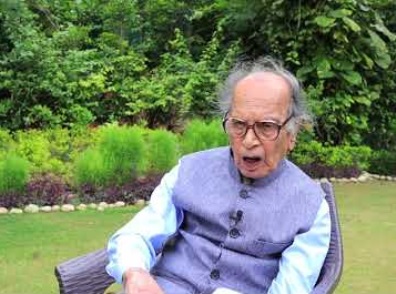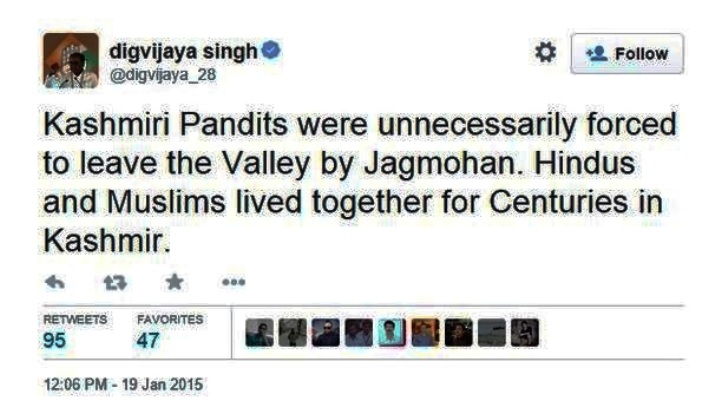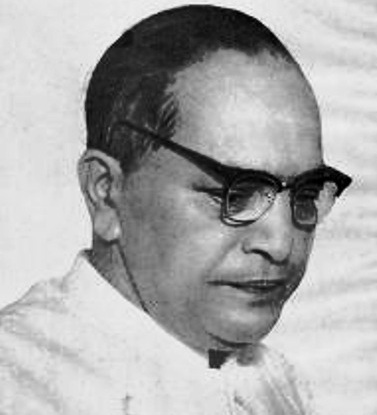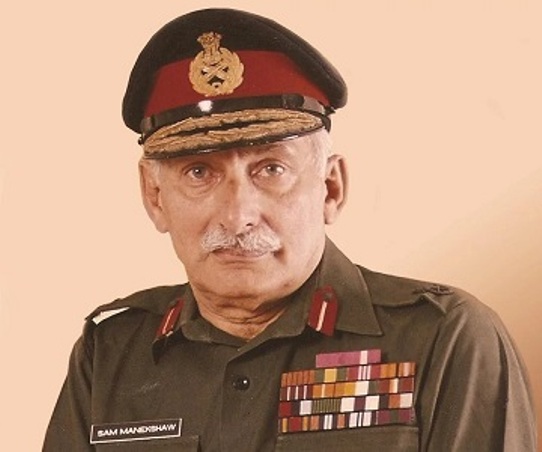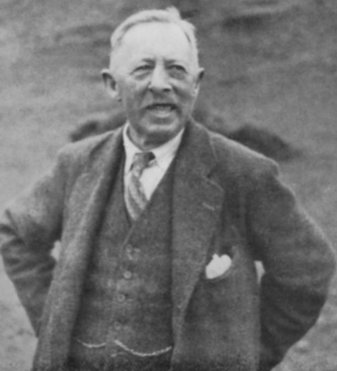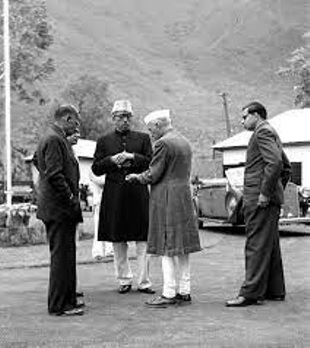SHEIKH MUHAMMAD ABDULLAH (Dec 5, 1905 - Sept 8, 1982)
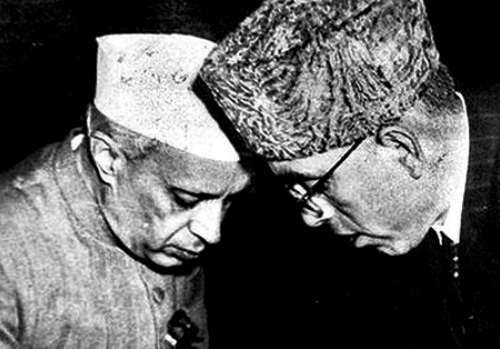 |
 |
And that is how he was known, a towering personality, the undisputed, unchallenged, unrivalled and betrayed political leader till he breathed his last. Sheikh Abdullah’s only achievement as Prime Minister for six years of rule was the abolition of feudal land ownership, 'Land to tiller' as it was referred to, a step to hit the Pandit landowners and Dogra Rajputs very hard, who carried on entertaining grudge to sabotage and scuttle his every political move thence-forth.The history continues..............
Pandit Nehru´s trump card, mesmerised and beguiled Sheikh Abdullah, a key source sedated local population to stay indifferent and unconcerned to landing of Indian 1 Sikh at Srinagar airport. Sheikh, perhaps, wasn´t aware that Maharaja Patiala´s elite force was already there in Srinagar guarding the airport much before landing of 1 Sikh or invasion of Pathan tribesmen or even purport accession document signed later. People´s attention diverted to: hamla awar khabardar, hum kashmiri hain taiyaar (O invader! beware! we kashmiris are ready to face you) Sheikh taken for a ride, had huge dividends in store for Pandit Nehru.
By 1953 Sheikh Abdullah realized India´s other intentions and objected to any interference from Indian Government. He reminded Nehru of his promise of independence for his country and this fragile and temporary friendship did not last very long and Nehru in his first opportunity arrested Sheikh Abdullah on 9th August, 1953 and installed a puppet regime of Bakshi Ghulam Muhammad. Sheikh Abdullah was released in 1970 and the geographical political change in the sub-continent, through emergence of Bangladesh in 1971 brought a lot of disappointment for Sheikh and the people of Kashmir. This time he was again hoodwinked not by Nehru but his daughter Prime minister of India Mrs Indra Gandhi by making him sign an accord known as "75 accord".
Abdullah did try to convey his intended political compulsions based on friendship, mutual trust and above all sincerity but the message seemed to have filtered through, for thoughtful Nehru always looked focused in different directions. Abdullah not being a visionary failed to understand the international situation towards the beginning of 1940´s when United Kingdom faced with acute economic slump had virtually decided to quit as they could not afford to keep their foothold in India any longer. Sheikh Abdullah's support for Maharaja Hari Singh for latter’s effort to keep both India and Pakistan away by offering to sign ´standstill agreement´ could have paved the way for a sovereign independent Kashmir.
SHEIKH REGRETS HIS BLUNDER
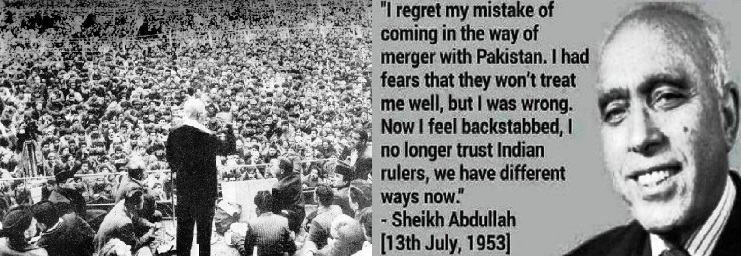

I am you and you are me, I am the body, you are the soul
Thereafter no one can say, I a stranger to you, you the same to me
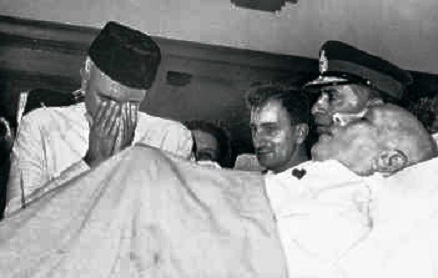 |
 |
Towards the end, perhaps, realising his mistake Nehru dropped all fabricated cases of treason against Sheikh who in spite of his long jail terms respected and revered him more than anyone else in India. 1962 war with China was the greatest blow and as believed Nehru now wanted to settle Kashmir issue and improve on good neighbourly relations with Pakistan which Nehru thought was inching towards a closer diplomatic and military relation with China.
The people of Kashmir always thought Sheikh Abdullah to be a force to reckon with and firmly believed him to face any challenges that would thwart the ambition of seeking independence for his country and people. The overwhelming people's support Abdullah mustered made him an undisputed leader to take individual decisions. He was a leader no doubt but lacked vision and political acumen. The trickiness of Pandit Nehru was too much for him to comprehend and even uptill his death could never believe a friend like Nehru to take him for a ride and dump him.
The evidence is rife and well documented that Sheikh Abdullah was emotionally attached to the ideals of Pandit Nehru who made him believe that Kashmir based on the principle of secularism and democracy will help carve out an independent Kashmir and Indian ethos based on same principles will guarantee Kashmir´s well being and security. The argument gives credence to the fact that towards the fag end of his life, Nehru asked Abdullah to visit and negotiate a settlement with President Ayub Khan of Pakistan. A positive response from Ayub Khan was too much for exciting Sheikh to encounter and within hours Pandit Nehru´s unfortunate untimely death dashed Abdullah´s hopes. No one had ever seen Abdullah crying in a manner as at the deathbed of Pandit Nehru at Teen Murti (Nehru´s official residence). As believed, Sheikh cried because he had been assured a definite solution to Kashmir by Pandit Nehru. It is widely believed that Nehru was poisoned and killed by Indian army.
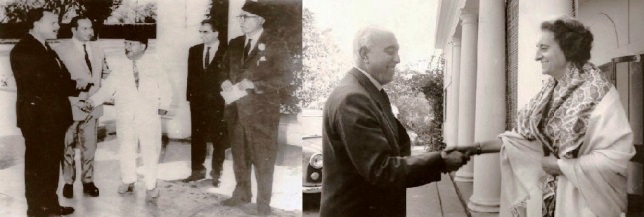
Golden opportunity missed at Rawalpindi - and the disappointment
Sheikh Abdullah had no cards to play when he concluded an Accord with Indira Gandhi and became Chief Minister on February 24, 1975. At the outset, on August 23, 1974 he had written to G. Parthasarathy: "I hope that I have made it abundantly clear to you that I can assume office only on the basis of the position as it existed on August 8, 1953." Judgment on the changes since "will be deferred until the newly elected Assembly comes into being" The caucus of political opportunists and greedy people around him Sheikh was coerced into accepting anything that was offered smearing his name and consigning his glorious past to history. A golden opportunity missed by a whisker due to incapability of political maturity displayed by Sheikh and his lieutenants.
Sheikh Abdullah's warning in 1952, that "any suggestion of altering arbitrarily this basis of our relationship with India would not only constitute a breach of the spirit and letter of the Constitution, but it may invite serious consequences for a harmonious association of our State with India", fell on deaf ears and from Nehru to Jagmohan all left no stone unturned to erode the relationship that Sheikh Abdullah had, apparantly, developed with his mentor, Nehru.
Under the circumstances if Abdullah were a seasoned politician he would wait to keep Maharaja engaged in domestic politics allowing him to rule as sovereign head of the state especially when International political support was visible. The subsequent development of relation between him and Nehru sent alarming bells to Pakistani leadership who were rather emotionally attached to Kashmir. The disappointed Chowdhry Ghulam Abas another Kashmir leader and Kashmiris who had become part of the newly created Pakistani army (notable among them were the mastermind of Pathan invasion Major Khursheed Anwar, and Akbar Khan with a pseudonym General Tariq if taken into confidence, would have joined hands and a strategy evolved would culminate into a situation that would leave Kashmir undisturbed both by India and Pakistan and Pathan invasion would have been out of question.
Spearheading attacks from two-faced, white collar Pandits in the valley, Abdullah faced another formidable opposition from Hindu-dominated Jammu region. Disgruntled officials in Hari Singh’s administration and deprived Hindu landowners formed an organization Praja Parishad that always managed to give Abdullah a tough time. A special mention must be made of a school teacher Balraj Madhok, a Hindu fundamentalist of Jana Sang party, vehemently opposed to Muslims all over India in general and Kashmiri Muslims in particular who did not spare a moment to unleash scathing attacks on Abdullah and Kashmiri Muslims.
Unlike Maharaja Hari Singh, Sheikh Abdullah was in two minds. The former showed resilience to stay independent till the last moment but for the unfortunate intrusion of Pathan tribesmen from North West Frontier Province the course of history would have been entirely different. The Maharaja was so adamant that he even refused to entertain Mountbatten of Burma and managed to send him back to India empty-handed. Pandit Nehru succeeded with verbal promises and a few gestures of political statements to hoodwink Sheikh as the latter used his leadership to control the malleable mindset of Kashmiris to gain time for an Indian military stronghold on Kashmir. A firm military grip on his ‘ancestral home’ was enough for Nehru to dispense with his expendable friend accusing him of sedition or treason. Sheikh sensing the betrayal messed up his political future with empty roars in Kashmir and behavior of a tamed Lion elsewhere in India.
"The existence of Kashmir did not depend on Indian money, trade, or defense forces, and did not expect any strings to be attached to Indian aid and threats. The taunts would not intimidate into servile submission". Sheikh received an overwhelming public support that he did not seem to respect or understand, and unfortunately sold Kashmir cheaply second time after the British traded Kashmir for a paltry sum to Maharaja Gulab Singh in the year 1846.
NEDOUS HOTEL SRINAGAR
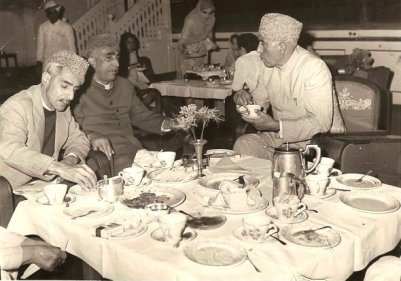 Serious discussion with Bakshi Ghulam Mohammad and Saddruddin Mujahid at Kashmir´s famous Nedoes Hotel. Later Bakshi, the right hand man and a great source of strength, sensed his wavering political mind jumped the queue to sideline his mentor and leader to become a darling of Pandit Nehru. Still later, Pandit Nehru dumped Bakshi using Kamraj Plan to install other puppets down the line to keep the fragile grip over Kashmir.
Serious discussion with Bakshi Ghulam Mohammad and Saddruddin Mujahid at Kashmir´s famous Nedoes Hotel. Later Bakshi, the right hand man and a great source of strength, sensed his wavering political mind jumped the queue to sideline his mentor and leader to become a darling of Pandit Nehru. Still later, Pandit Nehru dumped Bakshi using Kamraj Plan to install other puppets down the line to keep the fragile grip over Kashmir.
Kashmiris betrayed by India and mushroom political non-entities using Kashmir for their petty economic interests and down the line we have Abdullahs, Bakshis, Sadiqs, Mir Qasims, Abdullahs’ progeny and this new breed of Mufti dynasty. The fact remains that Kashmiris have suffered enough and the time is not far when the blood of more than one hundred thousand people will result in a fulfilled dream of breathing fresh air in the atmosphere of an independent Kashmir. The people of Kashmir are grappling with the notion to understand their ´LION´ to remain faithful to Pandit Nehru even after being put behind bars and later banished from the State for more than two decades.
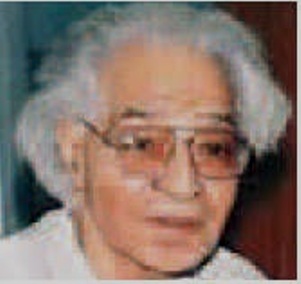
A renowned Indian scholar and an acclaimed writer commented on Sheikh Abdullah in the following manner: "Nehru’s backtracking on verbal promises, a provoked Sheikh’s utterances in public culminated into a fait accompli coup that silenced him through a direct order issued by Prime Minister of India, Jawaharlal Nehru, a sinister conspiracy of personal vendetta hatched in the state to topple Abdullah's government. The ground for his arrest was the fear that he would declare the state independent, and the quintet that pulled it off comprised Kaul, Mullick, Bakhshi, Karan Singh and that consummate wirepuller, D.P.Dhar. Despite the decade long judicial proceedings against the Sheikh, there was nothing to prove, and the trial had to be called off. Sheikh was released and all this was not enough for him to learn a lesson."
UNEQUIVOCAL TERMS BY ALL QUARTERS INTERNATIONALLY

Giving peace a chance, Kashmiris changed the strategy (2010) and used stones and bricks to fight Indian army armed with lethal weapons that left more than one hundred fifty dead.An impression created by mischief mongers that Muslim rulers of Kashmir converted people using force and also desecrated or destroyed places of worship belonging to the majority Hindu and Buddhist community. It is illogical to think that any Muslim ruler would make a few million Muslims to migrate and drive the local population out. The fact remains that the call of Islam heeded by huge majority rejected idol worship and would not need the idols any more. In this connection M L Kapur in his book History of Jammu & Kashmir talks about Muslim rulers and makes a special mention of Sultan Sikandar (1389-1413) who banned gambling, drinking of wine, dancing of women and the practice of Sati among the Hindus. In matters of religion also, Shah Mir and most of the successors were perfectly tolerant, and made no distinction between their Hindu and Muslim subjects. Qutb-ud-Din 1373-89) even used to offer prayers at the Hindu temples. INDEPENDENT KASHMIR
CREDIBILITY OF "INCREDIBLE INDIA"
One morning of Dec-Jan 1990, notorious Indian CRPF (Central Reserve Police Force) knock at the door of Abdul Ahad Bhat of Batmaloo, Srinagar and demand the TV set to watch their favourite program Ramayana. The lady of the house opens the door to find uniformed armed infantry men staring at her with the demand and the next minute she collapses and is rushed by her relations to the hospital to be declared dead. In Kashmir incredible India does such miracles on daily basis.

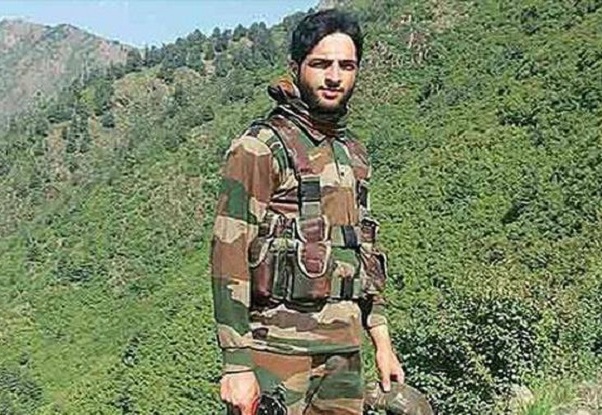





































































 Military Curfews do not deter masses from coming out on the roads to protest Indian rule and continue the fight with stones and bricks to convey the message that India must leave Kashmir. Indian overtures towards Soviet Union were tactfully planned mainly to use USSR VETOs to frustrate rest of the world denying to hold the promised plebiscite in Kashmir. India´s truculent behaviour paid dividends leaving Kashmir simmering on the burner
Military Curfews do not deter masses from coming out on the roads to protest Indian rule and continue the fight with stones and bricks to convey the message that India must leave Kashmir. Indian overtures towards Soviet Union were tactfully planned mainly to use USSR VETOs to frustrate rest of the world denying to hold the promised plebiscite in Kashmir. India´s truculent behaviour paid dividends leaving Kashmir simmering on the burner
